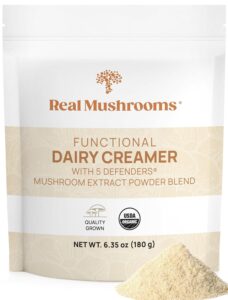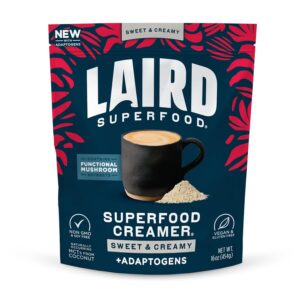Adding coconut oil to coffee has become increasingly popular among health enthusiasts and those looking for an energy boost. This simple addition can improve your morning brew into a powerhouse of benefits.
Let’s explore why you might add coconut oil to your coffee or use creamers with MCT oil.
The Benefits of Coconut Oil in Coffee
Coconut oil is rich in medium-chain triglycerides (MCTs), a type of fat that’s easily digested and quickly converted into energy. When added to coffee, it can provide several advantages:
- Sustained Energy: The combination of caffeine and MCTs can give you a longer-lasting energy boost without the typical coffee crash.
- Improved Focus: Many users report enhanced mental clarity and concentration when consuming coconut oil with their coffee.
- Potential Weight Loss Support: MCTs may help boost metabolism and increase feelings of fullness, which could help with weight management efforts.
- Nutrient Absorption: The healthy fats in coconut oil can help your body absorb fat-soluble vitamins and nutrients more effectively.
- Taste Enhancement: Coconut oil adds a subtle, creamy flavor to coffee, making it a delicious choice to traditional creamers.
Understanding MCT Oil
MCT oil is colorless, odorless, and remains liquid at room temperature. It is popular among those following ketogenic diets because it is quickly metabolized and can help maintain ketosis.
While coconut oil contains MCTs, MCT oil is a more concentrated source. Some people prefer using MCT oil in their coffee for its neutral taste and potentially more potent effects.
However, both coconut oil and MCT oil can offer similar benefits when added to your morning coffee.
PureCoffeeCraft is a participant in the Amazon Services LLC Associate Program, an affiliate advertising program created for sites to earn fees by advertising and linking to Amazon. If you are making a purchase at Amazon today, please click on one of my links. There is no extra cost for consumers who purchase from links.
Product Reviews: Coconut Oil-Based Coffee Creamers
Let’s take a look at some popular coconut oil-infused coffee creamers on the market:

Rising Tide Focus Mushroom Coffee Creamer
This unique creamer blends coconut powder with adaptogenic mushrooms for enhanced energy and focus. It’s plant-based, vegan, and unsweetened, making it suitable for various dietary preferences.
Pros:
- Contains functional mushrooms for added benefits
- Non-dairy and vegan-friendly
- No added sugars
Cons:
- Mushroom flavor may not appeal to everyone
- Slightly grainy texture reported by some users

RYZE Superfood Creamer
RYZE offers a mushroom-based creamer that includes probiotics and six adaptogenic mushrooms. It’s designed to support energy, focus, digestion, and immunity.
Pros:
- Contains a variety of useful mushrooms
- Includes probiotics for gut health
- Gluten-free and keto-friendly
Cons:
- Some users find the taste unusual
- May need experimentation to find the right serving size

Real Mushrooms Plant-Based Functional Coconut Creamer
This organic creamer combines coconut with mushrooms, lucuma powder, and Ceylon cinnamon. It offers 90 servings per container and is designed for use in coffee or smoothies.
Pros:
- Organic ingredients
- Versatile use in coffee or smoothies
- No artificial additives
Cons:
- Higher price point
- Some users report a strong mushroom taste

Laird Superfood Non-Dairy Coconut Powder Creamer
As the #1 bestseller in plant-based coffee creamers, Laird Superfood’s offering includes adaptogens and functional mushrooms. It’s non-GMO, vegan, and comes in a 16 oz bag.
Pros:
- Popular and well-reviewed
- Includes adaptogens for extra benefits
- Sweet and creamy taste without added sugars
Cons:
- Some users find it doesn’t dissolve easily
- Relatively expensive compared to traditional creamers
Frequently Asked Questions
How much coconut oil should I add to coffee for fat loss?
While there’s no magic amount, most experts recommend starting with 1-2 teaspoons of coconut oil in your coffee. It’s important to introduce it gradually to allow your body to adjust.
Coconut oil is calorie-dense, so be mindful of your overall calorie intake if fat loss is your goal.
What are the potential side effects of adding coconut oil to coffee?
Some people may experience digestive discomfort, especially when first introducing coconut oil to their diet. This can include symptoms like nausea, stomach cramps, or diarrhea.
Start with a small amount and increase gradually.
If you have any underlying health conditions, ask with a healthcare professional before making significant changes to your diet.
Can you share a good recipe for coconut espresso?
Here’s a simple and delicious coconut espresso recipe:
Ingredients:
- 1 shot of espresso or 1/2 cup strong brewed coffee
- 1 tablespoon coconut oil
- 1/4 cup coconut milk
- 1/4 teaspoon vanilla extract (optional)
- Sweetener to taste (optional)
Instructions:
- Brew your espresso or strong coffee.
- In a blender, mix the hot coffee, coconut oil, coconut milk, vanilla extract, and sweetener if using.
- Blend on high for 20-30 seconds until frothy.
- Pour into your favorite mug and enjoy your creamy coconut espresso!
Adding coconut oil to coffee can be a tasty and potentially useful way to start your day.
Personal Thoughts: Coconut Oil in Coffee
A Closer Look at the Coconut Oil Coffee Trend
What users really appreciate about adding coconut oil to their coffee is the smooth, creamy texture it imparts and the sustained energy boost it provides. Many report feeling more focused and alert throughout the morning without the typical mid-day crash often associated with regular coffee consumption.
The subtle coconut flavor enhances the coffee’s taste without overpowering it, making it a pleasant choice to traditional creamers or milk.
Users have noted that incorporating coconut oil into their coffee routine has been relatively easy. Most find that starting with a small amount, such as a teaspoon, and gradually increasing to their desired level works best.
This approach allows the body to adjust to the extra fat intake and minimizes any potential digestive discomfort.
Blending for Best Results
For optimal results, many coconut oil coffee enthusiasts recommend using a blender to mix the oil with the coffee. This creates a frothy, latte-like consistency that’s both delicious and satisfying.
Some users have invested in small, portable frothers specifically for this purpose, making it easy to prepare their coconut oil coffee even when traveling or at the office.
Frequently Asked Questions
How long does it take to see benefits from adding coconut oil to coffee?
While person experiences may vary, many users report feeling increased energy and focus within the first week of regularly adding coconut oil to their coffee. However, for potential weight loss or metabolic benefits, it may take several weeks to notice significant changes.
Can coconut oil in coffee break a fast?
Technically, consuming coconut oil does break a fast as it contains calories. However, some intermittent fasting protocols allow for small amounts of fat during fasting periods.
It’s best to talk to a healthcare professional or nutritionist to decide if coconut oil coffee aligns with your specific fasting goals.
Is it safe to add coconut oil to coffee every day?
For most people, adding moderate amounts of coconut oil to coffee daily is safe. However, it’s important to consider the extra calories and fat intake in the context of your overall diet.
Those with specific health conditions or concerns should talk to a healthcare provider before making this a daily habit.
Can coconut oil in coffee help with ketosis?
Many followers of the ketogenic diet find that adding coconut oil to their coffee helps maintain ketosis. The medium-chain triglycerides (MCTs) in coconut oil are quickly metabolized and can potentially boost ketone production.
However, it’s essential to watch overall carbohydrate intake to confirm staying in ketosis.
Potential Drawbacks and Considerations
While many users rave about the benefits of adding coconut oil to their coffee, it’s important to consider potential drawbacks. Some people may experience digestive discomfort, especially when first introducing coconut oil into their diet.
Starting with a small amount and gradually increasing can help mitigate this issue.
Additionally, coconut oil is high in saturated fat, which has been a topic of debate in the nutrition community. While some studies suggest that the type of saturated fat in coconut oil may have neutral or even positive health effects, those with specific health concerns should talk to a healthcare provider before significantly increasing their saturated fat intake.
Final Thoughts – Is Coconut Oil Coffee Worth Trying?
Overall, adding coconut oil to coffee has proven to be a popular and potentially useful practice for many users. The combination of sustained energy, improved focus, and a creamy, satisfying taste has made it a staple in many morning routines.
While it may not be for everyone, those looking to enhance their coffee experience or explore potential health benefits may find it worth trying.
Users report that incorporating coconut oil into their coffee has been a positive experience, with many noting improved energy levels and a more satisfying start to their day.